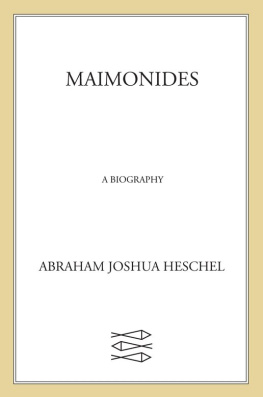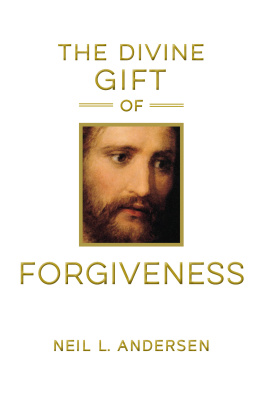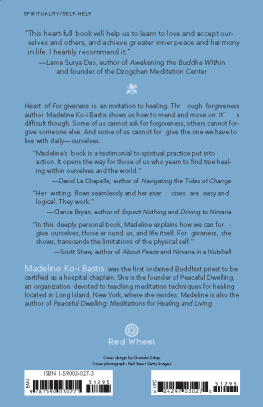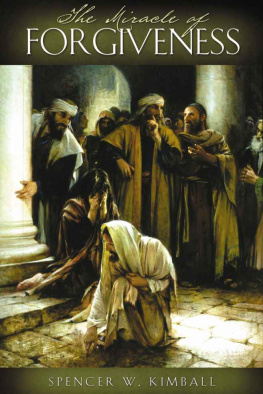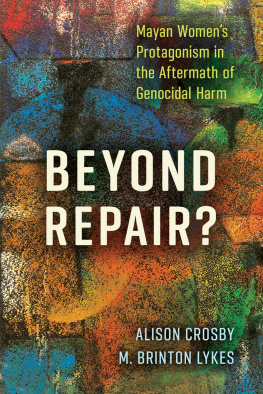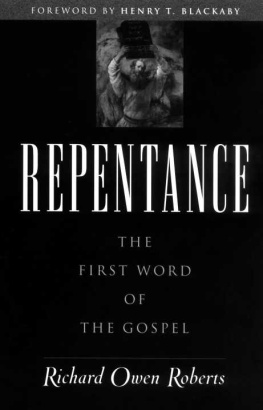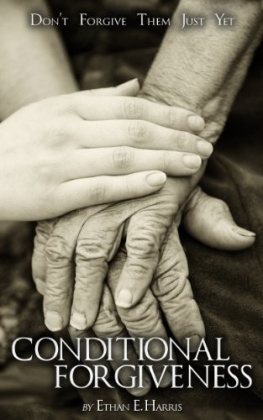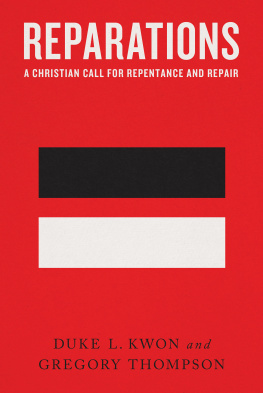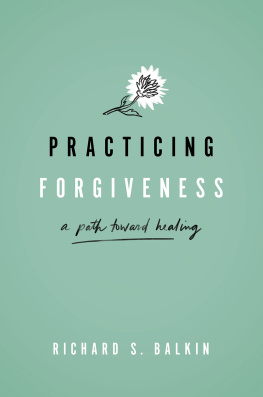Contents
Pagebreaks of the print version
Guide

For everyone engaged in the hard, painstaking work described in these pages.
For Nir, as ever.
AUTHORS NOTE
This book discusses many kinds of harm, caused by many different types of perpetrators, both individual and collective. Im not sure what kind of single trigger warning or content warning I could put on a book that would address sexual abuse and assault, intimate partner violence, slavery, racism, white supremacy, police brutality, ableism, homophobia, transphobia, gun violence, colonialism, mass incarceration, genocide, and the other painful topics that are discussed at various points. So suffice it to say that there are difficult stories in here. Please take care of yourself as you read, as you take breaks, as you skip the stories you need to skip, as you engage with the book in the ways that make sense to you.
This book also tells many stories and cites the insights of many people. There are times when particular aspects of a persons lived experiences are especially relevant to a conversation at hand, and it is disingenuous to pretend otherwise. So, for example, when race is at stake in the conversation, I try to center race by naming whether a scholar or journalist is Black, white, and so forth, to situate their comments in the context of their own lives. I am inconsistent about this, both because not every story discussed here requires that kind of additional context and because not everyones identity is known to me. And, of course, people have other aspects of their identity that are not necessarily mentioned that may inform their perspective as well. I cannot say that I have done this perfectly, but the attempt is thereto offer transparency and to highlight the ways in which our lived experiences can be, in themselves, a source of authority. These choices are, of course, filtered through my own identities and experiencesas, among other things, someone who is white, Jewish, feminist, queer, has experienced a mobility disability, and a myriad of other thingsand others may have made wildly different choices as a result of theirs.
Translations of Jewish texts are a mix of the translations offered on Sefaria.org (notably Rabbi Adin Steinsaltz for Talmud, and both Rabbi Simon Glazer and the Sefaria Community Translation for the Mishneh Torah) and my own original or adapted translation. Whenever possible, I tried to translate cases involving a generic person with the pronouns they and them. That classical Jewish texts use the third-person masculine singular (he and him) to describe a person doing a thing may be understandable, given the vicissitudes of both the Hebrew language and the patriarchy. But in places where the text clearly intends to describe one who..., I use the singular they to create a more open reading from a gendered perspective.
INTRODUCTION; OR, WHATS MISSING WHEN WE SEEK TO REPAIR HARM
Kellys sister Susan was often angry as a kid, and her parents did little to contain or check her behavior as she was growing up. During their childhood and early adulthood, Susan often abused Kelly verbally and emotionally, and once, when they were in high school, she physically assaulted Kelly. As a result, Kelly distanced herself from Susan, and they have been semi-estranged for years. Since Susans divorce, however, Kellys parents have increasingly pressured Kelly to forgive her sister, to be more understanding about Susans current challenges as a single mother of small children, and to show up as a support during this difficult time. Should Kelly forgive her sister? Should she reenter her life? Does it matter whether or not Susan has apologized for her past actions? What are Susans obligations, here? What about their parents obligations? What, if anything, is owed to Kelly, and from whom?
Isabella I of Castile and Ferdinand II of Aragon, rulers of Spain, expelled all the Jews from the country in 1492, a devastating blow to a robust community that had been on the Iberian Peninsula for over seventeen hundred years. In 2015, the Spanish Parliament sought to offer redress, inviting descendants of those who had been expelled to apply for Spanish citizenship. But despite the laws declaration that Spain welcomed these people to reencounter their origins, opening forever the doors of their homeland of old, the process for doing so seemed astonishingly demanding. In fact, as the provisions of the law were being discussed, several members of parliament noted how onerous these requirements appeared to be. The window for sumitting applications was open for only four years, and those seeking citizenship had to supply proof of lineage, pass a four-hour Spanish-language test, and complete a citizenship test covering various topics in Spanish culture and society. To even be considered, applicants had to travel to Spain to finalize their file with a Spanish notary. And in the end, Spain approved only about 20 percent of the applicants and retroactively implemented additional requirements, claiming that they were concerned some applications might be fraudulent. Should this law be considered appropriate amends to the descendants of the Jewish community? If more allowances had been madea greater window of time or less red tapewould the gesture be adequate? What else, if anything, might Spain be obligated to do with regard to the descendants of the Jews banished for the crime of being Jewish? Does twenty-first-century Spain even owe these descendants anything at all?
The woman who created and popularized the gender reveal partywriting up a gathering she held during her first pregnancy in what would become a viral blog postshared, eleven years later, that she regretted having done so. Part of her regret was because of the immediate, material harm that was sometimes caused as a result of increasingly outrageous revealswildfires, accidental deaths. But mostly she felt bad about placing even more cultural emphasis on the sex assigned a baby at birth. She now understands, as she has shared on Facebook and elsewhere, that this emphasis can damage trans and nonbinary kids, as well as limit the gender expression of cisgender kids. What, if anything, should she do now? What could or should her repentance work look like? Are her obligations tempered if, at the time, she was ignorant of the potential harm of her blog post? If she had no idea that her party idea would create such a significant cultural impact?
The challenges surrounding apologies and forgiveness, repentance and reconciliation, amends and atonement invite a lot of questions, and theyre neither simple nor theoretical. They impact the very structure of our criminal justice system. They are ever-present in our rapidly shifting conversation on sexual abuse. These questions haunt the legacies of every country touched by colonialism and white supremacy, and they hang painfully over our intimate bonds, our family and professional relationships, and our communities.
And in the United States, most of the time, weve gotten them very, very wrong.
To put it bluntly, American society isnt very good at doing the work of repentance or repair.
And though weve seen a recent increase in public attempts to hold harmdoers to task, theres still a lot of confusion in the cultural conversation about what that might entail. What are we asking of the person who has done wrong? What work must they take on in order to repair, to whatever extent possible, the harm that was done? How should we regard them if they have caused harm and tried to fix it? If they have not done any amends work? What does justice look like, what does healing look like, and what are the roles of the victim and the perpetrator in this process? And what, if any, is the role of those who were neither harmed nor perpetrated harm in all of this? Theres still a lot of uncertainty in our social discourse on these matterseven more so when were not talking about individuals perpetrating harm, but rather institutions, other organizations, or even nations.



